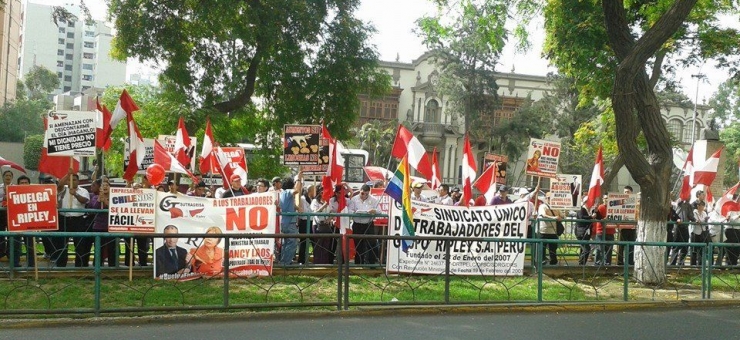OECD complaint filed against Ripley for violating workers’ rights

June 3, Chile - UNI Global Union, the International Trade Union Federation for the service sector, representing 20 million workers in 900 affiliated unions in 150 countries around the world, filed a complaint today with the Organisation for Economic Co-operation and Development (OECD) National Contact Points in Chile, Peru and Colombia, for RIPLEY CORP SA’s actions that seriously affect human rights and freedom of association of its employees in Peru.
The complaint in Peru shall be delivered at 2:00 pm to the National Contact Point in Lima in the framework of an international mobilisation with more than 80 union representatives from 14 countries in the region.
Adriana Rosenzvaig, UNI Americas Regional Secretary, stated that UNI Americas believes in social dialogue, but the behaviour of Ripley is socially irresponsible.
UNI Global Union’s General Secretary Philip Jennings said, “'The Ripley promise has been broken. They have adopted a new and aggressive course of action. Walking away from a global agreement to victimizing staff for raising legitimate workplace concerns. It’s time for Ripley corporate leadership to change its ways.”
The OECD Guidelines for Multinational Enterprises provide a regulatory framework on labour and human rights, and procedures to be followed by companies of member countries. The National Contact Points (NCPs) have a responsibility to promote compliance with the Guidelines in foreign multinational companies operating in Chile, and in Chilean multinational companies operating abroad, whether or not they are member countries.
The complaint focuses on Peru and gives many examples of discrimination against union members and leaders. The complaint describes how union members systematically face discrimination in wages and lack of permanent contracts.
The complaint contains evidence on harassment and retaliation against union leaders and dismissal of workers who formed unions and participated in legal strikes.
Specifically, the complaint alleges that:
- Ever since the founding of the union, the company systematically dismissed the leaders, who were then reinstated by the Peruvian court of justice recognising the legitimate rights of workers. Not content with this decision, in 2009 the company filed a lawsuit to dissolve the union, but again the court of justice supported the workers rejecting the complaint.
- In late 2013, during the negotiation process for a new collective agreement, RIPLEY began putting pressure on workers to leave the union. It became obvious that there was persecution of union members and that pressure was put on them. All resignation letters were exactly the same and were presented by the same person. Also, emails from the Head of Human Resources celebrating these resignations fell into the hands of the union. On the 12th of May, 2014, SUTRAGRISA denounced RIPLEY’s new union busting practices to the Labour Inspectorate.
- In May this year, RIPLEY began a new round of mass layoffs of 23 workers at Cajamarca’s store, in retaliation for union actions against poor working conditions.
RIPLEY CORP SA is one of the leading multinational companies in South America dedicated to retailing and consumer credit. It has 42 stores in Chile, 22 in Peru and 3 in Colombia, throughout the production chain; the company reported that it employs 24,944 people.
UNI holds talks with RIPLEY since 2008, and has suggested signing a Global Framework Agreement to establish social dialogue mechanisms to respect fundamental human and labour rights according to ILO and OECD standards, and corporate responsibility guidelines.
However, until now, RIPLEY has not given a satisfactory response or resolved the situation.
UNI Global Union considers the 'good offices' approach of the OECD process a very appropriate way to reach a solution in this case; and understands that the NCPs try to settle complaints by means of conciliation or arbitration between the complainant and the company. UNI welcomes the opportunity to participate in this kind of process, and hopes to achieve a positive, negotiated and mutually beneficial solution.
If it is impossible to reach a negotiated agreement, UNI will request the NCP to issue a final statement confirming whether the Guidelines have been respected or not.
For more information and interviews contact
Colombia:
Peru:
Chile:

